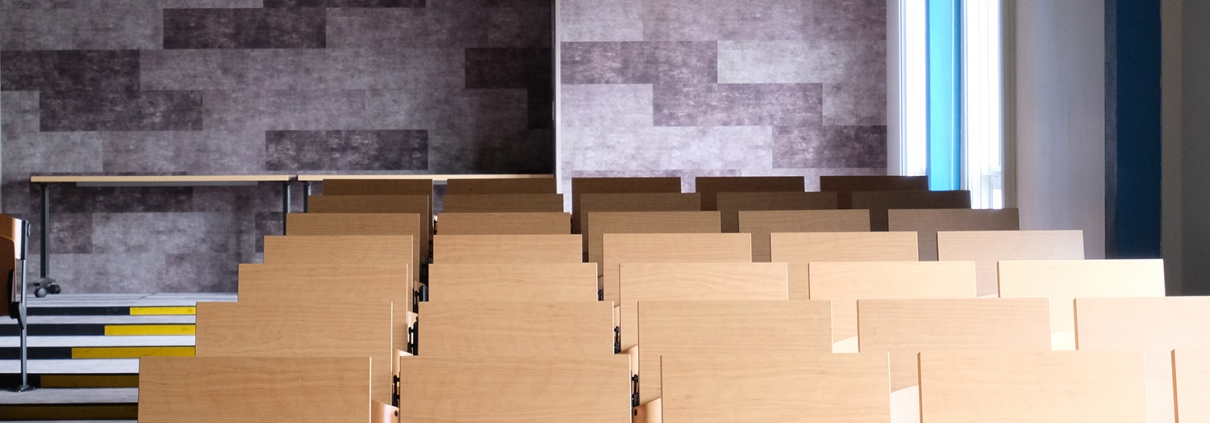The Revolution Will Not Be Televised (and Neither Will the P.D.)*
Author: Jennifer Bryan, Ph.D.
From the Leadership + Design monthly newsletter
Students arrive in dribs and drabs for the assembly with an outside speaker and fill up the back rows of the auditorium. Some may venture half way down the big space but no one opts for the first 20 rows, until teachers come in and make the students move closer. Come on, guys. This is our invited guest. It’s rude to sit in the back.
 Adrienne Rich understands that education is something you claim, not something you “get,” yet even she might only choose the 12th row. Because when the grown-ups become the students for professional development programs, many quickly lay claim to tables in the back, the seats closest to the exit. And when the guest cajoles them to move closer, some refuse!
Adrienne Rich understands that education is something you claim, not something you “get,” yet even she might only choose the 12th row. Because when the grown-ups become the students for professional development programs, many quickly lay claim to tables in the back, the seats closest to the exit. And when the guest cajoles them to move closer, some refuse!
Enter Parker Palmer, a candidate for the open position of Professional Development Fairy Godfather (PDFG). Several on the planning team are not in favor of candidate Palmer. Skeptic 1: Doesn’t he talk about spirituality and inner wisdom? Skeptic 2: We need practical recommendations, not touchy feely visionary crap. Skeptic 3: This is about relevance and take-aways. Tools we can use tomorrow.
By a L+D miracle, Parker Palmer gets the job, and the first question he asks is “What is the current condition of your teachers?” He then hears about a dedicated, hurried, overworked, underpaid, hurried, stretched-thin, undervalued, hurried community of adults who want the very best for their students. Skeptic 2 tells him: We believe that student learning has to be engaging, relevant and meaningful; we work hard to provide that every day. Palmer observes that their working conditions sound stressful, and Skeptic 1 reminds him that this is a dedicated group of educators.
Any of this sound familiar? I know many teachers who feel overwhelmed by all they are expected to do but assume that there is something lacking or not up-to-snuff about themselves. They feel powerless to suggest (except for some faculty lounge carping) that the system, as constructed, produces this emotional state. The state of overwhelm is not due to an absence of individual grit. The anxiety wells up when there is an institutional illusion that the condition of the spirit is irrelevant to the real-world problem of producing successful graduates and robust bottom line.
Understanding the experience of the learner—and the collective of learners— is critical to any educational enterprise, and we need to pay far more attention to the condition of the adults who attend professional development (PD) programs. The parallel process between the experience of the K-12 student learner and the grown-up teacher learner couldn’t be clearer. We are all human beings who wish to succeed, and to be successful in the current over-scheduled, performance-driven, let’s-add-one-more-program-but-not-take-anything-away condition of our schools, efficacy matters most. But effective is now code for shorter, faster, immediate, measurable.
Anxious Student 8: Just give me the answer so I can finish the project and turn it in on time because I have another paper due tomorrow that I haven’t even started.
Anxious Teacher 5: Just give me the right tool or tell me what to say or provide a ready-made lesson because I have 22 students who needed this yesterday.
The tighter we cling to the norm of effectiveness the smaller the tasks we’ll take on, because they are the only ones that get short term results…care about being effective, of course, but care even more about being faithful, as countless teachers do— faithful to your calling, and to the true needs of those entrusted to your care.
PDFG Palmer is talking about faith and calling. This is exactly why the planning committee was afraid of hiring him! Gil Scott-Heron intones, repeats: the revolution will not be televised. But that was back in 1970! In 2019 the revolution will not be texted or tweeted or shared in a Google Doc. The revolution, the transformation we yearn for in education will only happen in real time, with real people who trust each other enough to risk the vulnerability inherent in learning.
Relational trust has been and always will be at the heart of any teaching/learning effort. So when the skeptics sit in the back of the PD program, it’s because they do not trust that the teacher who has been invited to work with them understands their real needs, their true condition. That is why attending to and building trust is the first step. In our privileged, resource rich schools which would you prefer? The working group that has all the latest educational technology, full of members who mistrust each other; OR the group that has scrapped, collaborated, disagreed, failed, laughed and succeeded its way to mutual trust, yet only has some paper and a bit of scotch tape?
My favorite sage at the moment is Margaret Wheatley; she points to the passionate potential that lies in successful PD. There is no greater power than a community discovering what it cares about. However, let’s be clear. This kind of learning and discovery takes trust and TIME, which is, hands-down, the most precious commodity in modern educational life. No surprise then that it is with a scarcity mentality about TIME that schools repeatedly make mistakes by creating/offering the
 one-and-done professional development program (PDP)
one-and-done professional development program (PDP)- 75 minute after school workshop (often on a Friday!)
- voluntary 2 hour session in August before school starts
- all-community summer read on unconscious bias that is discussed in small groups for 30 minutes at opening faculty meetings, never to be mentioned again
It’s not that any of these opportunities is necessarily a bad idea, but none of them can stand alone pedagogically. We forget that adult learners need scaffolding and repetition and practice just as much as their students do. Fortunately the content-learning, repetition, synthesis and practice opportunities also just happen to be relational, emotionally rich, trust-building opportunities as well. And for those still skeptical, I invite you (a) to a look at the Lake Michigan size quantity of research that demonstrates how attention to emotions is fundamental to good pedagogy or (b) read the 20th Anniversary Edition of Parker Palmer’s The Courage to Teach: Exploring the Inner Landscape of a Teacher’s Life. Better yet, make the book this summer’s faculty read.
* apologies and thanks to Gil Scott-Heron, 1970


